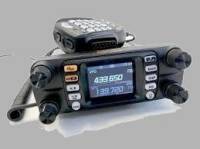|
Click The Radio Image On The Left To Return To Homepage Feel Free To Copy Any Information On The Webpages |
| |
| WIRES-X Usage Info
For those of you that enjoy using WIRES-X nodes, whether personal, or repeater nodes around the world, I thought it appropriate to suggest that node users consider following some basic usage protocol.
1. WIRES-X is a network of nodes providing a method of communicating with other hams around the world.
2. When using WIRES-X through a personal node, repeater node, or reflector, users should remember to disconnect when finished conducting communications, connecting and disconnecting are both important operations when using a node. Unfortunately, quite often, many stations fail to disconnect causing problematic issues for local nodes and WIRES-X repeaters causing traffic to be continually be rebroadcast through the node or repeater and interfering with local repeater traffic.
3. Do not connect to a node or WIRES-X repeater if you're not sure that you're in effective range of the node, or repeater. If your signal is marginal you may not be able to disconnect and the node will remain active until it times out. Do a little research and locate personal, or repeater nodes in your area. You can obtain a complete listing of active WIRES-X nodes at:
https://www.yaesu.com/jp/en/wires-x/id/active_node.php
4. This is redundant, however worth repeating, if you fail to disconnect from a node connection that you initiated, the node may continue transmitting communications traffic through all interconnected node(s) making if difficult for local users to use the WIRES-X node network, or cause problems with local repeater communications traffic until the node has timed out.
5. There are exceptions to the rule, one such exception is the America-Link reflector node system. It's sort of a clearing house where users can connect and see who's all connected, and then issue a call to chat with one of the participating connected nodes/users. However, once again, remember to disconnect when you're finished, especially if you've accessed a system like America-Link through a local repeater node, otherwise, all the America-Link traffic will continue to be broadcast through the local repeater and all local repeater traffic will interfere with America-Link if you failed to disconnect, or until it's timed out.
6. The WIRES-X node system is intended for communicating with other hams, not intended as a scanner for personal entertainment purposes tying up a local repeater, communicating means actually participating in conversations with other hams, not tying up a repeater node without ever uttering a word.
Just baisc common sense use of a networked communications system. If you're having difficulty with how to use WIRES-X you have two excellent options available to you:
1. Ask a fellow ham you know, or if you belong to a club, ask one of the club members for assistance on how to use WIRES-X, or;
2. READ THE MANUAL THAT CAME WITH YOUR RADIO ....... DUH!
Bob Krueger, AB7CQ Web Administrator 146.920/146.320 PL 123.0 444.600 / 449.600 PL 100 Repeater IRLP Node: 7515 PL 114.8 ab7cqradio@ebidpal.com |
